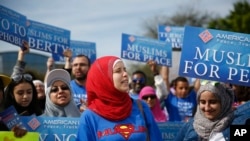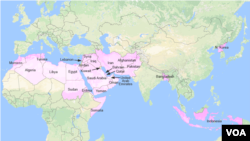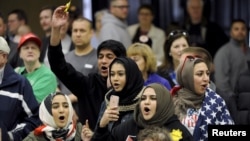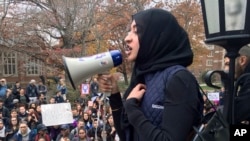Hundreds of civil rights advocacy groups have asked President Barack Obama to dismantle a program once used to register foreigners from a list of predominantly Muslim countries, in a bid to stave off efforts by Donald Trump's incoming administration to revive the system.
In a letter addressed to Obama and posted online Tuesday, 198 local and national organizations around the U.S. called for executive action to immediately rescind the National Security Entry-Exit Registration System, known by its acronym, NSEERS.
"NSEERS was a discriminatory policy that ran counter to the fundamental American values of fairness and equal protection," the groups wrote, adding that it was "ineffective as a counterterrorism tool, has resulted in tremendous harm for individuals who were directly affected, and has disrupted relationships with immigrant communities."
The post-9/11 George W. Bush-era policy, created by the Department of Justice, was gutted in 2011 during Obama's first term, but the framework remains in place. President-elect Trump and several advisers have publicly expressed interest in focusing registration and surveillance efforts broadly on Muslims, and in reviving NSEERS.
The American Civil Liberties Union, which advocated for the suspension of NSEERS, notes there were no terrorism-related convictions among the more than 90,000 entries in the database. The list included foreign visitors arriving from certain countries where there was thought to be a terrorist threat. Mostly students, the people on the list were required to register and then check in occasionally.
Framework for new registry?
A member of Trump's transition team, Kris Kobach, played a role in crafting the registry. Kobach's name has surfaced as a contender to lead the Department of Homeland Security (DHS), which oversaw the NSEERS program.
Kobach was seen leaving a meeting with the president-elect Sunday in New York, and carrying a paper that included a top line item of "update and reintroduce" NSEERS as part of a "Strategic Plan for first 365 days."
The Topeka Capital-Journal in Kansas, where Kobach is secretary of state, captured the picture of Kobach leaving Trump Tower and reported on the document's contents, much of which had been addressed publicly by Kobach in recent weeks. Kobach told Reuters last week that Trump's policy advisers were discussing reinstatement of NSEERS.
Asked whether the Trump administration would ban Muslims from coming to the U.S., as described by Trump during his presidential campaign, Luis Quiñonez, a member of the Hispanic Advisory Council to the president-elect, told VOA’s Latin America division last week that it would not be a "ban," rather it would "slow down the process." He added that the new administration would be "dusting off" such policies already in place.
DHS effectively ended the program in 2011 by removing the countries on the list, declaring it "redundant" given immigration procedures, and adding that it "no longer provides any increase in security." The action gutted NSEERS, but didn't strike the program from the books, leaving the option open for a revival.
"Unless this program is rescinded, the Trump administration will come into office with a framework already in place to quickly implement a so-called Muslim registry," National Iranian American Council Executive Director Jamal Abdi said. NIAC was one of the groups that signed the letter. "This discriminatory framework must be removed before it can be exploited and innocent people are targeted."
Increased opposition
Trump campaigned heavily on rhetoric about Muslims, immigrants and refugees beginning in 2015 — comments that were widely seen as disparaging of those groups. That talk resonated with his base of supporters, who also rallied around his declarations to build a wall along the southern U.S. border.
Trump sometimes conflated the groups, including one exchange with a reporter in which he answered questions about a "Muslim registry" last November with a response about illegal immigration.
Then, in December 2015, Trump called for a "total and complete shutdown of Muslims entering the U.S. until our country's representatives can figure out what is going on." He erroneously cited a Pew Research Center study to support his claim that hundreds of millions of Muslims around the world have "great hatred towards Americans by large segments of the Muslim population." Pew says no such study exists.
Abed Ayoub, policy director at the Washington, D.C.-based American-Arab Anti-Discrimination Committee, which spearheaded Tuesday’s request to the president, calls Trump's interest in surveilling mosques and targeting Muslims for additional surveillance "problematic."
"We'll fight against whatever the next administration seeks to implement," Ayoub said. "We'll make sure our voice is heard."
He's confident the work to organize the communities that would be affected by such policies are stronger now than when NSEERS was first implemented.
"We do have strong organizations — who will fight for your rights, fight for your liberties. A lot of the things he's suggesting will be struck down in court," Ayoub said.
NSEERS countries
The following are the 25 home countries of Muslims subject to the National Security Entry-Exit Registration System, known by its acronym, NSEERS: Afghanistan, Algeria, Bahrain, Bangladesh, Egypt, Eritrea, Indonesia, Iran, Iraq, Jordan, Kuwait, Lebanon, Libya, Morocco, North Korea, Oman, Pakistan, Qatar, Saudi Arabia, Somalia, Sudan, Syria, Tunisia, United Arab Emirates and Yemen.







